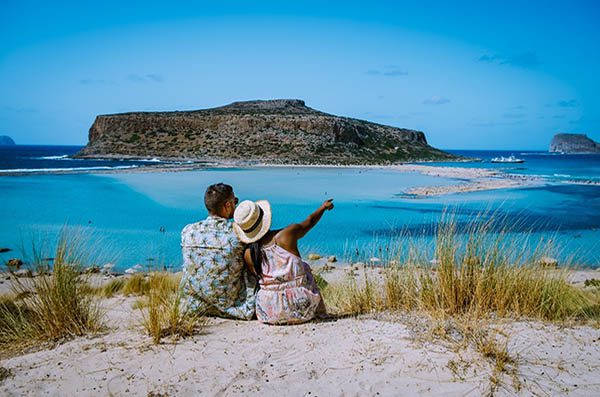Guided day bus tours to BALOS Beach and GRAMVOUSA Islet on Crete Island...the perfectBeach Tour on the Island of Crete

BEST BEACH TO VISIT ON CRETE ISLANDEnjoy the summer on Crete!


DESCRIPTION OF BALOS BEACH & GRAMVOUSAWhat, where, how is Balos Beach
(Balos Lagoon) and the Gramvousa Islet, in the province of Chania - Western Crete

Location Detailsthe Beach of Balos
The beach of Balos, also known as Balos Lagoon, is one of the most iconic and breathtaking natural landmarks in western Crete, Greece. Nestled on the northwestern tip of the island near the Gramvousa Peninsula, Balos is renowned for its exotic beauty, turquoise waters, and striking landscape that combines white and pink sand with rugged mountainous surroundings.
A Natural Wonder
Balos is a shallow lagoon formed between the Cape Tigani and the Gramvousa Peninsula, and it’s framed by the islets of Imeri Gramvousa and Agria Gramvousa just offshore. The area is protected under the Natura 2000 network due to its ecological significance and fragile natural habitat. It is home to rare species of flora and fauna, including sea turtles and monk seals.
The lagoon’s waters are exceptionally clear, and the sand has a distinct white color with streaks of soft pink, the result of crushed shells and coral. The unique combination of shallow warm waters and a stunning palette of blues and greens creates a surreal tropical feel, despite being in the Mediterranean.
Getting There
Balos can be reached in a couple of ways:
– By boat: Daily boat excursions run from Kissamos Port, offering a more relaxed approach and usually including a stop at the historic Gramvousa Island, known for its Venetian fortress and pirate legends.
– By car and hike: Visitors can drive to the Balos Beach parking area via a dirt road from Kissamos, and then hike down a rocky path (about 20-30 minutes) to reach the lagoon. The hike offers spectacular panoramic views that are well worth the effort.
What to Expect
Balos is largely undeveloped and retains its natural charm. There are minimal facilities — a few seasonal canteens may operate during the summer months, but visitors are generally advised to bring their own water, snacks, and sun protection.
The shallow waters of the lagoon are perfect for wading and are ideal for families with young children. Beyond the lagoon, the sea becomes deeper and more suitable for swimming. The area is popular for photography, nature walks, and simply soaking in the serenity of one of Greece’s most celebrated beaches.
Best Time to Visit
The ideal time to visit Balos is during the shoulder seasons (April–June and September–November), when the weather is warm but the beach is not crowded. In peak summer months (July & August), the beach attracts many visitors, though the good thing is the beach area is so big that you always can find areas with even few or no people if so you wish.
Balos Beach is not just a beach; it’s a must-see natural spectacle and a quintessential Cretan experience — wild, remote, and utterly unforgettable.
Gramvousa with its castle has been the scene of important historical events from the ancient world, the Venetian rule, to the present day. The impressive and naturally beautiful cape has been “sung a thousand times”.
The people who have inhabited it over the years have woven their fascinating history into the wild and untamed form of the rocky islet.
Gramvousa, also Grampousa (Greek: Γραμβούσα or Γραμπούσα, further names include Akra, Cavo Buso, Cavo Bouza, Garabusa and Grabusa), refers to two small uninhabited islands off the coast of a peninsula also known Gramvousa Peninsula (Greek: Χερσόνησος Γραμβούσας) in north-western Crete in the regional unit of Chania.[1] The Gramvousa Peninsula forms the more westerly of the two pairs of peninsulae in northwestern Crete (the other being Rodopos Peninsula), and is the western part of Kissamos Bay.
Imeri Gramvousa (Greek: Ήμερη Γραμβούσα), which translates to Tame Gramvousa, hosts the remains of a Venetian fort and the remains of buildings left behind by Cretan insurgents, who were compelled to live as pirates during the Greek War of Independence. Today, Imeri Gramvousa is a popular tourist attraction. Imeri Gramvousa, a jewel-island of Crete dominated by wild beauty and awesome legends of pirates and treasures!
Agria Gramvousa which translates to Wild Gramvousa, is much less hospitable and is located due north of Imeri Gramvousa. It has also been named False Gramvousa.[2]
In ancient times the larger island was known as Korykos, which means leather bag. The island was named “Gramvousa” in honour of Vousa, the wife of a pirate chief and the only inhabitant of the island to evade capture when the pirates were forcibly removed.
(by Wikipedia)
Discover the Wild Beauty of Gramvousa, Chania
Off the northwestern coast of Crete lies Gramvousa, a captivating islet where nature meets legend. Surrounded by the crystal-clear waters of the Balos Lagoon, its landscape is a dramatic blend of rugged cliffs, golden shores, and vivid turquoise sea. Wild herbs and native flora scent the air as seabirds soar overhead. The views from the top of the island—where a Venetian fortress still stands—are simply breathtaking.
A Fortress of Freedom and Resistance
Built by the Venetians in the late 1500s, Gramvousa’s fortress once protected vital trade routes from Ottoman invasion. Later, during the Greek War of Independence, it became a critical base for Cretan rebels and infamous pirates, symbolizing the fierce spirit of resistance. Today, the ruins echo with tales of battles, courage, and the island’s enduring quest for freedom.
Visit Gramvousa to explore its raw natural beauty and walk through the pages of Cretan history.
–











BOOK THEM WHILE THEY'RE HOTOffers for more daily tours in CRETE
SOMETHING FOR EVERYONEInterested to BOOK a DAY TOUR to BALOS & GRAMVOUSA ?
click the BOOK NOW button below, select the area your hotel / location is and get all the details...
Balos Beach is not just a beach; it's a must-see natural spectacle and a quintessential Cretan experience — wild, remote, and utterly unforgettable

